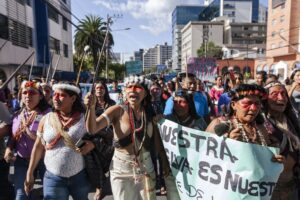Florida’s gulf coast is home to many natural wonders: diverse estuaries, lush mangrove forests, expansive beaches, and so much more. Having grown up surrounded by wetland ecosystems in St. Petersburg, Ava Thompson chose to dedicate her studies to preserving her home state’s ecology. Now a junior at Florida State University, Thompson is studying environment and society, the academic concentration on the intersection of environmental science and sociology.
Thompson doesn’t just study Florida’s natural environment—as a surfer, she lives, breathes, and swims in it, too. Given surfers’—including Thompson’s—close personal connection to the ocean, it’s not surprising that the sport has produced some of the world’s most enthusiastic advocates for ocean preservation and shoreline restoration. Thompson herself is a participant in her university’s chapter of Surfrider, a non-profit environmental organization dedicated to protecting and preserving the world’s oceans, waves, and beaches. Last October, she attended a summit in California with other young environmental activists where they discussed volunteerism, activism, and restoration.
But Thompson’s work to preserve her local ecosystem goes beyond the classroom. She’s produced scientific writings with the U.S. Geological Survey on the subject of elk horn coral restoration, helped convert Florida State University to a plastic-free campus, and has made online content that illustrates accessible environmental sustainability on a national level. She also serves as an ecotour guide in St. Petersburg, educating locals and tourists on the importance of native species.
Through her work, Ava has seen first-hand the power that nature has in fostering connections with her community, her studies, and other like-minded activists—and she’s also come to understand how fragile those connections hang in the balance of a changing climate. Since St. Petersburg is situated between two bodies of water (Tampa Bay to the East and the Gulf to the West), Thompson and her neighbors’ livelihoods are uniquely vulnerable to the impending climate crisis. From mangroves to oyster reefs, aspects of the Floridian ecosystem act as natural deterrents for erosion, a product of the ever-increasing hurricanes that level Florida’s coastline. This struggle is not unique to the people of St. Petersburg alone—similar issues threaten to destroy the balance of the Sunshine State and all other coastal cities. Ava’s work is becoming more important than ever as the turning point in our planet’s long-term health and viability crystallizes into view.




